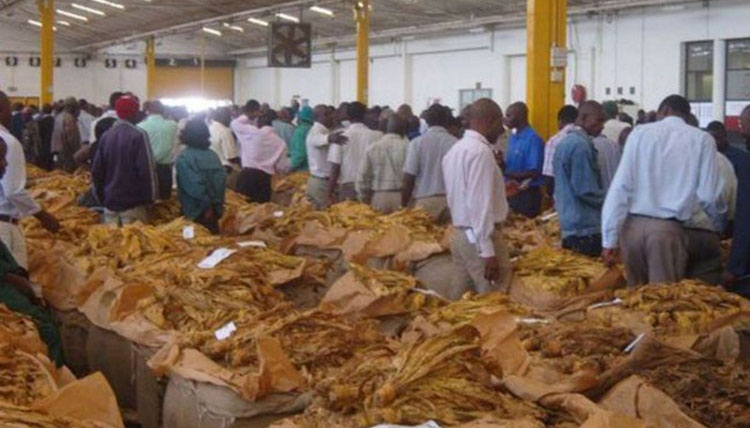
The Sunday Mail

Michael Tome
Business Reporter
Preparations for tobacco planting season started on a low key, with the Tobacco Industry Marketing Board (TIMB) confirming a 22-percent decline in seed uptake this year, compared to 922 853 grammes sold in 2018.
The decline in seeds demand for the 2019/20 farming season means a corresponding slum in foreign currency earning next year, with observers calling for authorities to start scouting for alternative sources to cover the deficit.
Official statistics show that 737 343 grammes of the tobacco seeds have been sold in 2019, when the planting season closed.
The oncoming season follows a turbulent tobacco marketing season that was characterised by a myriad of hitches including those stemming from varied policy pronouncements that directly impacted on the farmer’s earnings.
Although willing to support, some contractors have been also at pains coming back to sponsor the season considering the erosion in value of their 2018-19 season returns.
2019 tobacco selling season is rapidly heading towards its end, and close to 259 million kg have been delivered to the floors, reflecting 7 million kg ahead of the last year set record of 252 million kg. Contract sales are continuing and potentially might surpass the 260 million kg mark.
In an interview, TIMB chief executive Dr Andrew Matibiri, attributed the low-key preparations of the season to very low dam water levels since the crop requires to be irrigated prior rain water.
He indicated that the 22 percent drop in seed sales compared to last year, were reflective of headwinds being faced on the ground.
Dr Matibiri, however, hinted the seed sales were not as a bad as some sectors had predicted.
“The amount of seed that has been sold so far this year, is 22 percent lower than what was sold last year, which indicates that there was, perhaps, some reduced demand for the seed, but I think, all in all, it will not really affect those who want to produce tobacco because I think seed will still be obtainable from some other concerns that are in the business of producing and selling seedlings.
“Looking at the coming season, the situation, yes, does not appear to be very good, especially coming from a dry season last year, where dam levels and seedling production were low. We know this has been affected by that (dam water) because in some areas in northern areas, they do not even have water for normal household use, let alone for establishing seedbeds,” he said.
Concurring with Dr Matibiri’s sentiments, Tobacco Research Board (TRB) general manager Dr Dahlia Garwe, indicated the low rainfall pattern had contributed to the low seed uptake this year.
She said: “We should seriously factor in the low rainfall experienced in the last season as a determinant to the slump in tobacco seeds uptake, dam levels are low to irrigate.”
Dr Garwe, however, opined that commotion surrounding the pricing witnessed during the 2019 selling season, had potentially contributed to the decline in interest for growing the crop.
“There was confusion in terms of payment during this year’s tobacco selling season, farmers did not receive their dues in a way they expected.
“Also, when the selling season began, the exchange rate to USD stood at 1:2,5 and now is ranging above 1:15.
“That coupled with the rise of inputs cost, which has left the farmer incapacitated for the oncoming tobacco farming season,” she said.
The development comes at a time when indigenous tobacco contractors had previously warned of potential drawbacks to the approaching season as considerable number of farmers defaulted on their contractual agreements sparking fears that the sector might struggle to bounce back the forthcoming season.
Agritrade leaf tobacco field operations manager, Kuda Saringo, told the Sunday Mail Business that farmers have been unable to repay the invested funds, hence, a void in terms debt clearance.
“We are being owed almost US$3 million after an investment of US$4,7 million last tobacco farming season. We are now facing the challenge of survival on the oncoming season, we are on the edge as we need to service our Nostro debts, we are finding it hard to bounce back in the 2019-20 season,” said Mr Saringo.
He bemoaned the erosion of currency value, which he said posed a potential glitch to the approaching tobacco farming season.
As it stands, inputs prices, particularly fertilisers, have risen far much beyond sustainable levels of a meaningful tobacco production.
Agriculture is the mainstay of the Zimbabwean economy and tobacco is the major foreign currency earner alongside gold and platinum.
Last year, tobacco earned $900 million against gold’s $1,6 billion reflective of the crop’s salience to the national fiscus.The golden leaf is the country’s major foreign currency earner, and since 2009 has been pivotal in supporting the liquidity situation.
Brazil, Jordan, Japan, United States of America, Zambia, Namibia, Botswana, Malawi, Lesotho, the United Arab Emirates, India and Canada are some of the countries that import tobacco from Zimbabwe.



